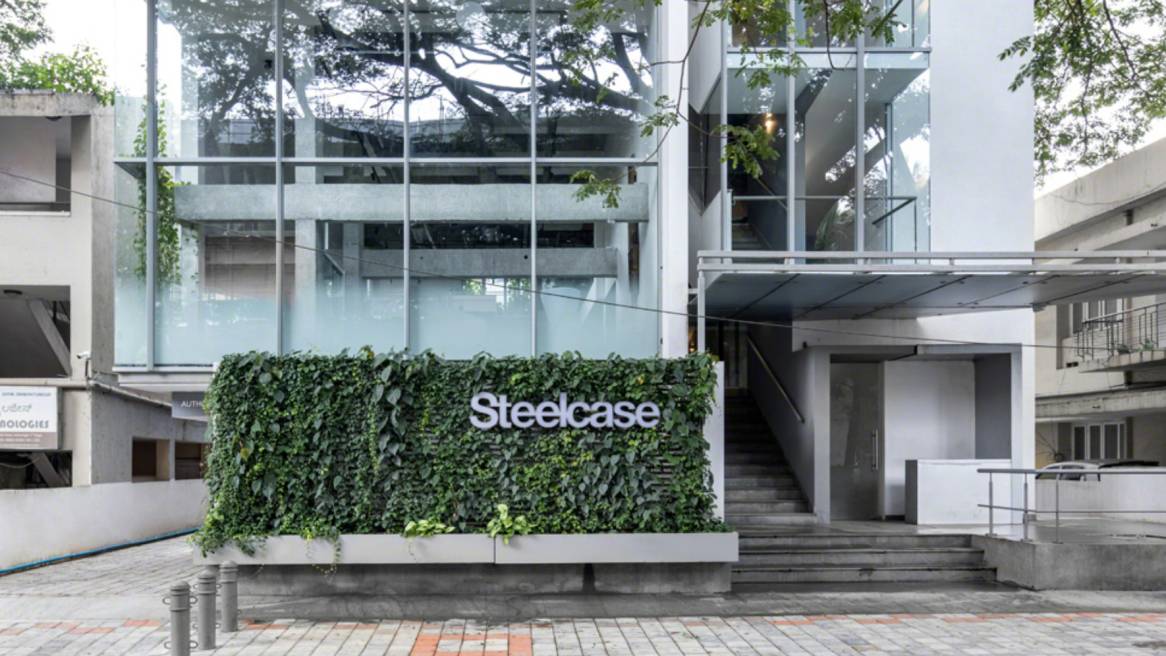Bengaluru: Steelcase WorkLife Center
Conceived and designed pre-pandemic, Steelcase’s groundbreaking WorkLife Centre Bengaluru offers a timely blueprint for the future of work with thoughtful design that serves business, environmental and emotional needs.
Large, floor to ceiling windows bring light and scenes of the lush and colourful streets of the Indiranagar neighborhood into the WorkLife.
The 12,740-square-foot space, which opened in India’s information technology capital in early 2020, is part of the global contract furniture manufacturer’s drive to transform the traditional workplace and adjust our ways of working through inbuilt flexibility and on-site amenities designed to encourage collaboration, innovation and creativity within a safe environment.
“We see it as a catalyst for Bengaluru’s forward thinking tech-savvy businesses, marking a cultural shift to new ways of working that encourage collaboration through a thoughtfully designed, engaging environment,” Praveen Rawal, Managing Director of Steelcase India explains.
The innovative interiors also reflect the city’s famously vibrant work culture, where great value is placed on forming close bonds through socialising.
“The showroom acts as a creative magnet attracting people who want to meet and build relationships,” says Steelcase interior designer Cameron Youds, part of the team that spent months searching for a new home before finding a stand-alone, three-storey building in Indiranagar, a leafy residential neighbourhood conveniently positioned midway between the Central Business District and several other new tech and creative hubs which are home to a concentration of technology startups, architecture and design firms.
“It was a deliberate move away from the corporate office scenario to one that would allow us the freedom to create a new kind of work culture,” Youds adds. “We wanted to be part of the fabric of the city, and a residential setting reflects our work-life philosophy.”
The Design Concept
The interiors, named Best Design Project 2020 by India’s Best Design Awards, were planned in close collaboration with Bengaluru-based RC Architecture.
“It was an unusual experience for us because, instead of receiving a design brief and coming up with a concept, we were given free reign to interpret their vision for responding to evolving needs in a holistic way,” says RC Architecture co-founder and Design Director Vijay D’Souza. “At the same time we worked very closely with Steelcase’s international in- house design team in Munich and Hong Kong to understand how they see people, place and technology in a holistic way.”
Two core principles underpin the design concept: flexibility, through designing multiple functions throughout the building in a versatile and durable way, and a meaningful connection with Bengaluru’s Garden City local vernacular, arts, crafts, cultural traditions and nature.
The first resulted in a simple yet effective arrangement of the main spaces for social activities on the ground floor, accessed directly from the street. Meeting rooms and workspaces for around 30 employees are on the second and third floors, and the spacious rooftop terrace with panoramic views is a rare urban outdoor amenity where Steelcase employees can relax, work and entertain guests.
Although each floor has its own distinctive character, the materials, textures and colours throughout reflect the region’s rich cultural heritage and the principles of biophilic design, reflecting humanity’s physical and emotional need for nature and integrating lush greenery and natural, tactile finishes such as stone, jute, terracotta and wood in soothing, muted earthy tones. Against this backdrop, custom made works of art with an unexpected contemporary twist reflect the city’s rich craft heritage.
The Entrance
A concierge at the high-top communal oak table in the intimate reception area decorated with a brushed bronze contemporary ceiling light fixture that emits a diffused glow sets the scene.
“Office receptions are usually highly polished, formal settings, but we envisioned it with a warm, friendly ambiance like being welcomed into a home,” D’Souza explains.
A 3-D Love how you work wall graphic that pays homage to Steelcase’s commitment statement promoting a meaningful balance of work and life, adds a playful inspiring touch, while a dramatic motif printed on the polished micro-concrete floor using nanotechnology is reminiscent of the intricate, colourful Rangoli pattern of rice, flour, coloured sand and petals that is traditionally drawn as a welcome gesture at the entrance to Bengaluru homes.
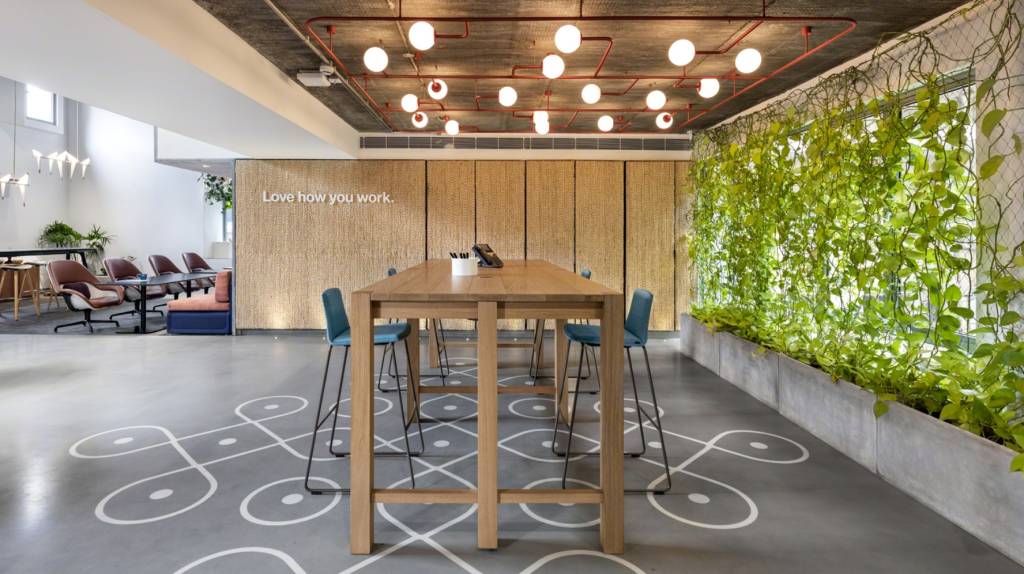
“The Rangoli is a well known traditional cultural symbol, and we felt that expressing it here in a contemporary style and enlarged scale would connect the workspace to the identity of Bengaluru in an unexpected way. It is something so recognisably local that the community is immediately engaged by the signal that this place is both human and playful,” explains Youds.
Managing Director of Steelcase India Praveen Rawal stresses that even the smallest, subtle touches such as choice of materials were carefully planned to express Steelcase’s values. “ the reception wall is lined with panels of a golden-hued woven jute which is widely used in the region. While it is a humble, functional material, it adds a warm, tactile touch to the entrance, it also reflects a local connection and our commitment to sustainability.”
The natural palette extends to incorporating greenery both practically and aesthetically. Private homes surround the showroom so, to protect views, and allow in natural daylight, indigenous vines grow up a fine steel mesh screen on the façade, and abundant plants throughout the showroom ensure a green element is never too far away. The mesh also improves the building’s thermal performance by diffusing sunlight, creating shade, and reducing heat on surfaces.
The WorkCafé
On the ground floor beyond the reception, the dramatic double-height, open-plan WorkCafé and an adjacent lounge area extend through a series of distinctive yet connected settings, providing possibilities ranging from a communal gathering space to host informal meetings or to relax in and connect with colleagues over coffee, to quiet spots to refocus and refresh oneself.
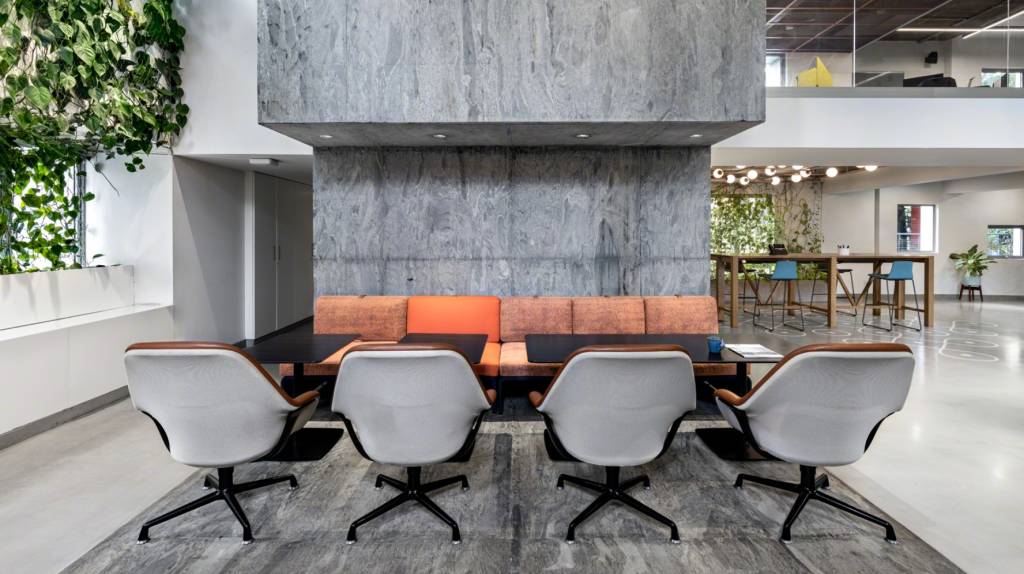
Its exposed ceiling, basic white walls and raw concrete beams give the expansive, light-filled semi-atrium a natural, contemporary feel.
“The building was still being constructed when we first saw it, but even in its raw state we could see that the bones were quite architectural and beautiful, which made us respectful of the site,” says Youds.
Although it was a new build, there were opportunities to work with the premises, he adds. “The original builders had used woven natural fibre mats to create a rough surface before they poured the concrete, because it makes it easier to bond the cement to the slab. This left a very rough surface with an interesting pattern, so we kept that and scrubbed it with brushes to create a tactile, rustic surface.”
The elementary, minimalist backdrop spotlights Steelcase’s signature contemporary furnishings arranged in reconfigurable settings. In the WorkCafé, the standing-height table with wood stools is ideal for a coffee, while nearby tables are surrounded by comfortable Rangoli-patterned Coalesse LessThanFive carbon-fibre chairs.
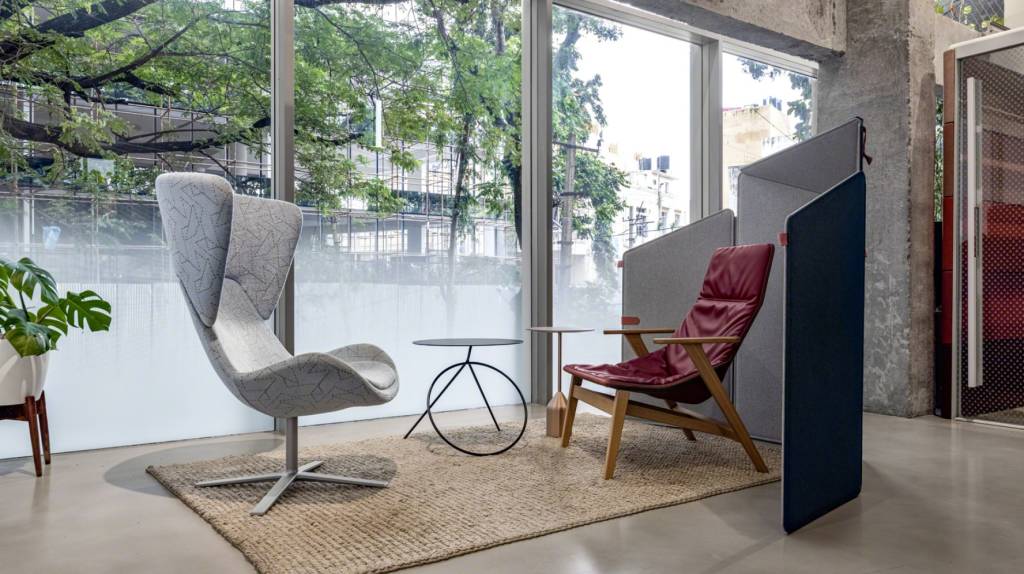
The 2,500-square-feet space also allows for other options, including an enclosed space for one or two people upholstered with soft acoustic panels and a frosted glass partition, areas with height-adjustable tower work surfaces for one-to-one exchanges, and an informal lounge setting with a sculptural modular sofa, armchairs, poufs and stools and integrated power. The lounge is anchored by three Nanimarquina rugs and screens digitally printed with a contemporary green pattern that add a homey touch while facilitating a variety of configurations depending on the wish for privacy, openness or solitude.
Hand-carved wooden moulds, traditionally used for making traditional decorative elements such as vases, tiles and window jail, a traditional stone or latticed ornamental architectural screen, in concrete, are arranged in a quirky graphic art installation on the wall, and whimsical origami bird lamps suspended in the café are a nod to the city’s burgeoning contemporary art scene.
“It feels like you are stepping into our home, where you can sit down and have a cup of coffee or tea,” says Bengaluru Sales Leader Siddharth Thangavelu. “And as people return to the office, the ability to feel that they can manage the natural distance between each other is important in making everyone feel safe and comfortable.”
The ground floor doubles as a non-traditional event area where Steelcase hosts gatherings for creatives to share their ideas, and community groups and unicorns hold off-site meetings. An 86-inch monitor with Virtual Puck and Telepresence support shared work experiences during meetings and events.
“One of the key goals of the showroom was to create a space that goes well beyond displaying products in a showroom; to provide an interactive area where everyone can experience a new, versatile way of using space,” says Rawal.
The Mezzanine: Collaboration and Focus
Reached by a lift whose doors feature a tree-inspired motif or a wide staircase of polished concrete with floor-to-ceiling windows, the airy 1,000-square-feet mezzanine level featuring a contemporary metal- mesh ceiling provides a flexible space designed for presentations as well as more private areas.
It centres on a bright, airy, private, high performance meeting room for 8-10 people within the open-plan interior. The videoconferencing technology and acoustics baffles buffer sound, and Casper Cloaking Technology, an architectural film that provides transparency yet blocks people’s ability to see what’s on a digital screen inside the room.
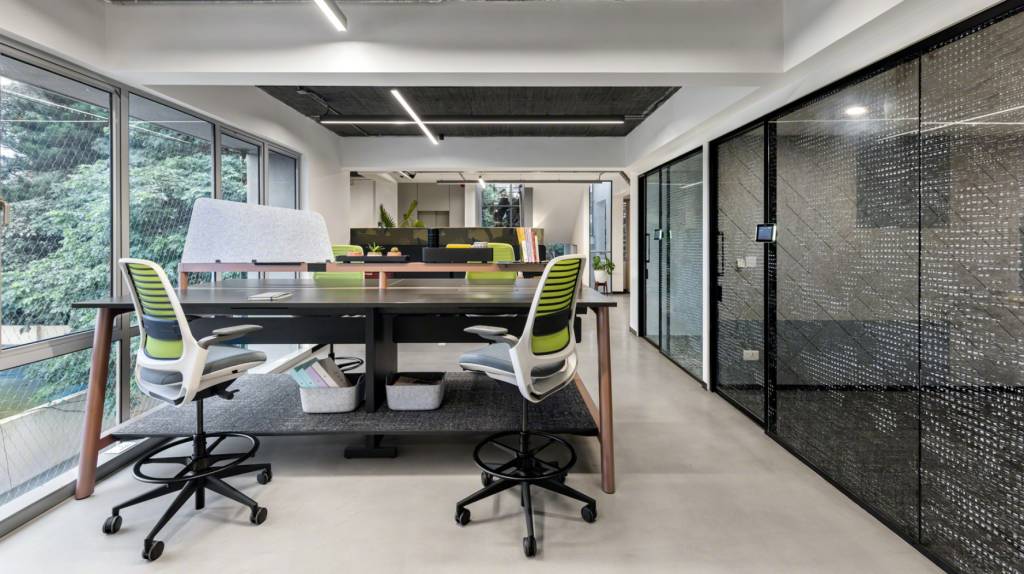
The meeting room cantilevers above the café and pantry creating a dramatic stage overlooking the floor below. This is further emphasized with the addition of a striking stone surface.
The mezzanine’s flexible layout and furnishings, which include Diversal Beam and Blade Worksurfaces combined with Sarto Screens, showcase how Steelcase envisages spaces designed for collaboration and individual focus, as well as shared areas that drive innovation. From a pragmatic standpoint, the layout reflects the diversity of the customers Steelcase attracts, from business owners, project managers and procurement agents to designers and influencers.
“A lot of our clients are fast-growing companies whose needs change continually and, because we regularly invite architects and designers to use the space at no cost so they can experience it for themselves, this area is a good example of how the workstations, tables, storage and desk accessories can be customised according to their needs at different times,” says Rawal. “They can experience products like the PolyVision Motif wall panels for themselves in a range of finishes, magnetic and writable surfaces, and m.a.d Urban Shelving to store resources and supplies.”
The workspace demonstrates how different furnishings and accessories go in a variety of settings from office to home, and a lounge area shows how well the formal workspace fits with a more relaxed personal space with proximity to technology.
“We see our role as helping to drive and activate creativity so our customers can make informed decisions and innovate even faster,” Thangavelu adds. “And with flexibility at the core, it means that we can keep evolving as a creative hub for the local community.”
Second Floor: Team neighbourhood
Health and safety are at the forefront of many people’s minds, and the next floor, an open-plan 2,200-square-foot space with floor-to-ceiling windows overlooking trees that flood the interiors with natural daylight, is larger with a mix of multifunctional workstations where it is possible, as current times demand, to work relatively safely at a distance in semi-private focus pods offering acoustic seclusion. A small balcony with comfortable chairs and worktables provides a mini-retreat that looks onto the surrounding coconut and pine trees.
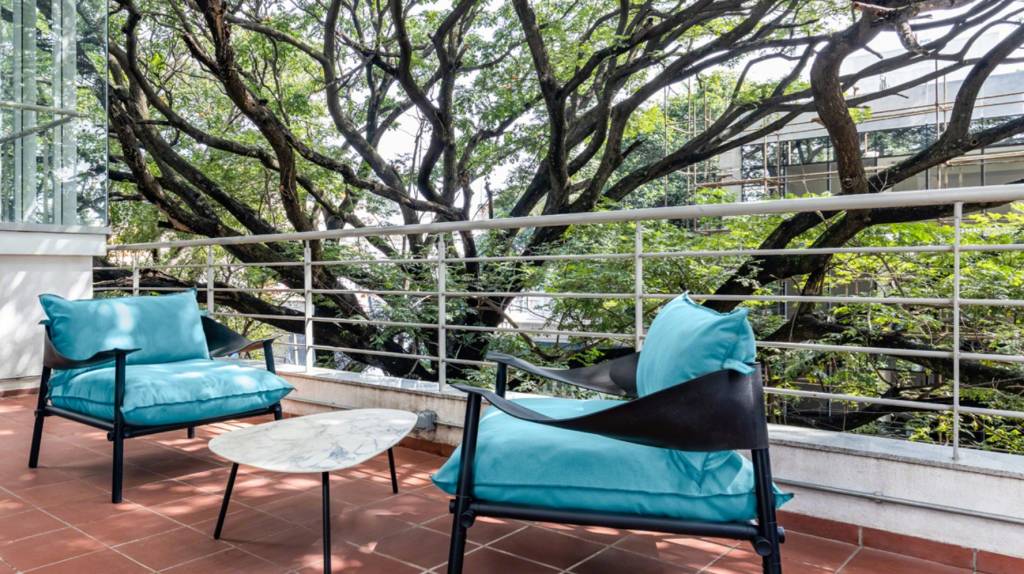
“Open-plan offices are great for communication, but we also design for privacy with an array of digital tools when you make a call or need a quiet place to concentrate,” says Rawal.
The global pandemic has certainly accelerated the importance of fungibility – an economic term referring to individual units that are interchangeable and reconfigurable.
“The WorkLife Centre is designed to be very agile and to provide the things people need. It must change fast and move the way you want it to support the way we work now,” Rawal explains. “India has the biggest Gen Y population who are interested in hard working and smart working spaces and who want choice and control in their workplace. That is how we function now.”
According to D’Souza, a first-hand experience of workplace flexibility is invaluable.
“In India, people don’t just like to see mock-ups of a workstation or space. They want to see it in use in real life from height-adjustable desks, moveable white boards and freestanding screens with magnetic edges to mobile power that allow people to change posture and location.”
And it is not just office designers who are interested in the experience. According to Thangavelu, customers also include owners of businesses, homeowners looking to set up an office or study at home, and those focused on health and wellness in the business environment. “Health and safety is now a major focus from taking different heights and weights into account to social distancing.”
Terrace
The carefully designed sprawling 1,800-square-feet outdoor terrace blurs the threshold between inside and out, its al fresco setting equipped with a pantry and plenty of weather-resistant seating, and tables that can be combined in multiple compositions for an event or a socially distanced respite space.
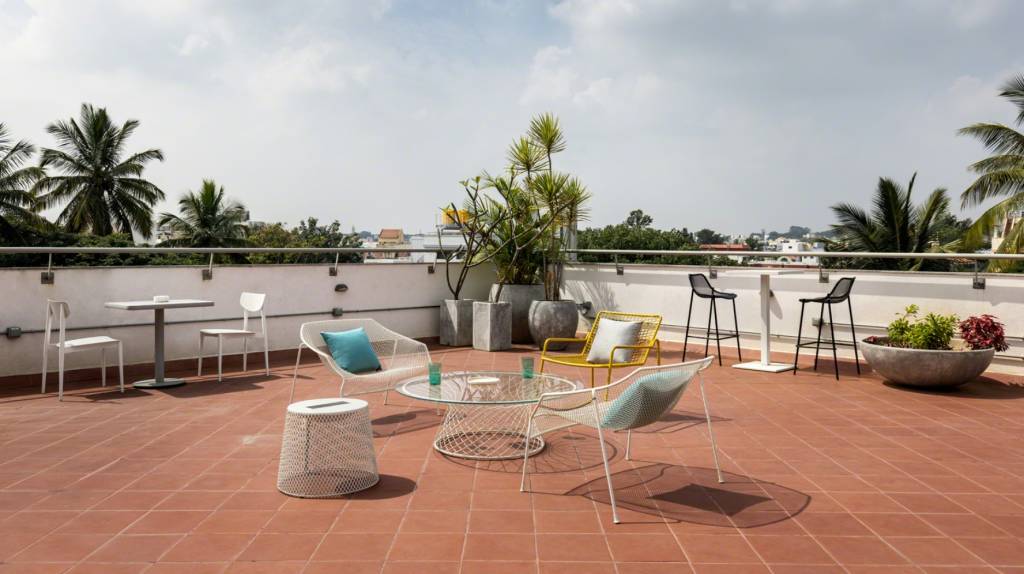
Overhead shading, umbrellas, plants and plenty of built-in power outlets have made this an especially popular communal workspace and retreat without any contrived Silicon Valley hyper-casualness.
“We were very excited about the idea of a terrace, because the weather in Bengaluru is so nice that people can sit outside throughout the year,” says D’Souza. “We kept it very straightforward though, with local terracotta clay tiles in an earthy colour, lightweight red and white furniture that feels bright and modern, and overhead string lighting that makes the terrace inviting – and gives a sense of Bengaluru.”
With the line between home and workplace blurring, attention to detail extends to a custom curated collection of contemporary tableware to enliven everyday staff meals, events and entertaining. Simple, locally made ceramic plates, bowls and copper water cups, and wooden roti boxes in vibrant reds, yellows and greens reflect a rustic, artisanal materiality and fuss-free approach to outdoor socialising on the terrace, while the indoor WorkCafé has earthy, matt pale pink and green plates and bowls, and off-white espresso mugs.
“Using objects and materials that are locally made is important because it gives the WorkLife Centre an authentic identity,” says Esther Van Wijck, the Hong Kong-based stylist who sourced the collection. “It completes the circle of experiences of style, substance and sustainability provided here.” Thangavelu agrees. “Bengaluru is a very social city and the WorkLife’s spaces and biophilic terrace offer us unique spaces to connect both with our customers and each other. Getting to know each other is at the heart of unlocking human potential.”
This inclusive spirit adds a dimension to the pleasure of meeting colleagues and friends too, and as Bengaluru emerges from months of necessary working from home, has proven prescient with a renewed appreciation of the pleasure of people and of places that are closely connected to their surroundings.
“Although employees have been working from home due to COVID-19, they’re keen to return to the office,” says Rawal. “The new WorkLife Centre has provided us with an outstanding opportunity to reaffirm our core values and our commitment to the well-being of our employees, the environment and Bengaluru culture through spaces that belong to our time and embrace the future.”

